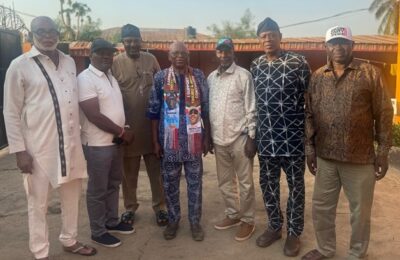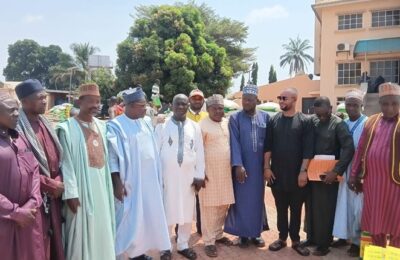A journey between two rivers is usually an interesting experience. Apart from the opportunities to be exposed to pleasing landscape and scenery along the coastlines and riverbanks, there are occasional stopovers to breathe in the calm air along the waterways. The voyage through the rivers is a pulsating timeout for the traveler which makes the journey naturally memorable.
However, where there is turbulence in the waters, this may portend clear danger and uncertainty for the paddle. Under the circumstance, the best and safest decision for the captain is to keep his head high above the water and remain focused to scale the hurdle; navigate the turbulence and get the crew and passengers to safety amidst the odds. For this to happen, it is important for the crew and passengers to remain calm, rise above emotions so that all can berth safely.
The current dilemma over revenue projection and actual receivables in all the 36 states of Nigeria has put economic managers and policy makers in the country in the same position as the captain of the boat navigating the turbulence between two rivers in the foregoing scenario.
Nigeria’s economic challenges stem from over-reliance on oil. This is further compounded by the seemingly unabated crime of pipeline vandalization and theft of crude oil, loss of the country’s major crude oil customers in the United States of America and Europe, discovery of oil through new technologies of extracting oil from shale gas by major international consumers of Nigeria’s crude oil; and current global efforts to explore renewable, cleaner and green energy. Despite efforts by major international oil exporters in the Organization of Petroleum Exporting Countries (OPEC) to stabilize the price of crude oil, the price has fallen from $115 per barrel in June 2014 to almost $65 per barrel, below the $74 per barrel in the 2014 budget projection.
For the first time since Nigeria became a major crude oil exporter, the country is today faced with the gloomiest economic prediction which foretells an unprecedented fiscal cut down that could see the government clearly incapable of meeting its fiscal obligations.
Much as the country’s economic managers have tried to douse the effect of the raging economic turmoil, there are glaring indications that Nigeria’s over-dependence on revenue from crude oil has exposed the economy to the global financial volatility resulting from sudden plunge in the international price of crude oil.
This development is indeed sending shock waves across the entire economy. Unlike previous experiences of dip in international oil prices, the current drop has resulted in a huge budget deficit and this could get even worse in the days, months or years ahead. Nigeria is certainly one of the biggest losers of the sharp decline in the global oil prices.
So far, the impact of the economic downturn has been so pervasive that the federal and state governments in Nigeria have not been able to fulfill their statutory obligations set out in their annual budget estimates.
Like other states in Nigeria, the Kogi State Government is faced with challenges in matching revenue projections with actual revenues accruing to the government. The 2014 budget which set out the income and expenditure framework of the Kogi State Government was tagged: “Budget of Reality”. The cardinal focus of the budget was to guarantee poverty reduction by generating employment and wealth creation to deliver minimum comfort to the majority of citizens of the state in line with the transformation agenda of the administration of Captain Idris Wada.
While the state government excelled in some of the projects and programmes aimed at reducing poverty and delivering succour to the people through critical infrastructure, youth and women empowerment, education, agriculture and rural development, there have been challenges in the implementation of some of the major projects, thus impacting negatively on the overall performance of the 2014 budget. As expected, the state government could not meet its target in projected revenue as a result of the fall in allocation from the federal government which is the major source of revenue to the state government. While there has been tremendous increase in Internally-Generated Revenue by the state, loss of substantial revenue by the federal government due to the fall in the international crude oil price has had adverse effect on revenue projection based on approved budgetary provisions by the state government.
A clearer indication of the downward trend in the economic fortunes of the state is evident in the revenue and expenditure performance in 2014 which was a far cry from the projection. For instance, total recurrent revenue approved for 2014 was N79, 681,175,888 out of which N49, 715,520,408 was collected as at October, 2014. This represents 62.39% in budget performance in terms of recurrent revenue. As for recurrent expenditure, a total sum of N58, 773,447,305 was approved, out of which N42, 449,773,686 was spent at the end of October, 2014 representing 72.23% in performance. On the other hand, a total of N70, 181,950,000 was approved as capital expenditure for 2014. The actual expenditure as at October, 2014 stood at N12, 265,781,722 representing 17.48% in budget performance.
The implication of the foregoing is that while the Kogi state government was able to fulfill its statutory obligations in recurrent expenditure as evident in the payment of salaries and allowances of its workforce in different sectors, the government has been unable to undertake some of the capital projects that would have had more lasting impact on the majority of the citizenry as anticipated in the 2014 budget.
Although the Kogi state government has had to contend with these grim challenges which are represented in the income and expenditure analysis, the administration of Captain Idris Wada has remained on track in its effort to transform the state. Having realized that too little can be achieved in the light of stark realities of dwindling revenue from federal allocation; the state government decided to explore creative means of generating revenue to finance capital project.
The state government floated a N20billion Bond on the Nigerian Stock Exchange. The proceeds from the Bond which was over-subscribed by investors based on the confidence reposed in the administration is being invested in eleven (11) major projects. The first tranche of N5 billion was received earlier in 2014, and so far all the projects for which the Bond was floated to finance have since kicked-off with some almost completed. Some of the projects being undertaken by the state government includes: the construction of Lokoja Township Road, construction of Ganaja-Otokiti Road Bye-pass in Lokoja, establishment of Kogi Geographic Information System, construction of 500-Unit Housing Estate in the state, establishment of Teaching Hospital at the Kogi State University in Anyigba, construction of a General Hospital at Odu-Ogboyega in Dekina Local Government, renovation of the Confluence Beach Hotel and construction of Kogi Hotels both in Lokoja, construction of Kogi House in Abuja as well as and water projects in Egbe, Okene and Anyigba The state government has also put measures in place to reduce wastages and revenue leakages in all sectors. The government has also improved Internally Generated Revenue from taxation leading to over 250% increase in IGR as at October, 2014. When completed, these projects have the potential to transform the state to its true status as the confluence of opportunities.
Despite the achievements of the state government in key areas of the economy within the limited resources available, it is sad that public perception of the government has raised questions about the extent to which government has gone in meeting the expectations of the people.
While it is justifiable that the people deserve improved welfare, the modest achievements of the government in the context of dwindling resources occasioned by the fall in revenue should elicit support from the people of the state.
Instead of the emotional outbursts that have characterized public comments in recent time including threats of industrial action by some stakeholders in the labour movement, it is important that our judgment of the performance of the government should be driven more by reason than emotions.
As plans for the year 2015 gather momentum, the Kogi State Government has put measures in place to sustain the aggressive transformation agenda of the government by building on the present level of development in the overall interest of stakeholders and indeed every citizen of the state. No wonder, this year’s budget is code-named budget of stability. Surely, if we remain steadfast and supportive of the government, our efforts will come to fruition.
Zainab Suleiman Okino is the Commissioner for Information in Kogi State. She wrote in from Lokoja.




